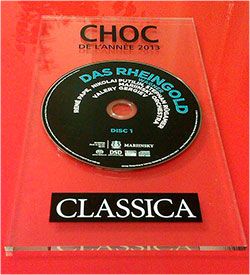| The Mariinsky’s Das Rheingold has been awarded the Choc de l’année, while its recording of Shostakovich’s Eighth Symphony was named “Editor’s Choice” by Classical CD Choice. | |||||

|
Respected French magazine CLASSICA has awarded its Choc de l’année prize to a recording of Das Rheingold, released on the Mariinsky label in September. This is the third time the prestigious award has been presented to Mariinsky label releases; previous wins include those for recordings of Dmitry Shostakovich’s opera The Nose and Pyotr Tchaikovsky’s Fourth, Fifth and Sixth Symphonies. Das Rheingold is the second recording in Wagner’s immense cycle Der Ring des Nibelungen, which the Mariinsky label plans to complete by late 2014. The magnificent cast of soloists (René Pape as Wotan, Ekaterina Gubanova as Fricka, Nikolai Putilin as Alberich, Stephan Rügamer as Loge, Mikhail Petrenko as Fafner and Yevgeny Nikitin as Fasolt) and the “first-class playing by the Mariinsky Orchestra” (BBC Radio 3’s CD Review) under the baton of Valery Gergiev received immediate praise from a plethora of leading music publications. The first release of the tetralogy – the opera Die Walküre, released by the Mariinsky label on 11 February this year – was also highly praised by international critics in addition to receiving Diapason d’or and Diamant d’Opéra prizes and five stars from Audiophile Audition magazine.
The release of Dmitry Shostakovich’s Eighth Symphony has been named “Editor’s Choice” and recommended as best classical recording by the British internet publication Classical CD Choice: “Valery Gergiev continues his much-acclaimed Shostakovich symphony cycle with this weighty and colourful (if unyielding) account of the Eighth Symphony. There is, of course, no conductor in the world today who conducts as much of the music of Shostakovich, and Gergiev bids fair to be the most authoritative voice among the composer’s spokesmen. There is no denying that Gergiev is more than ready to take on all the aspects of the piece from its more measured serious undertones to the almost manic energy of its allegro passages.” (Barry Forshaw, Classical CD Choice) | ||||